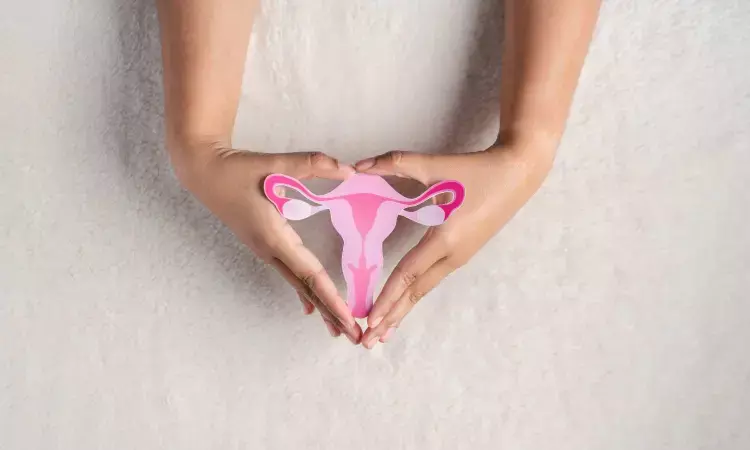- Home
- Medical news & Guidelines
- Anesthesiology
- Cardiology and CTVS
- Critical Care
- Dentistry
- Dermatology
- Diabetes and Endocrinology
- ENT
- Gastroenterology
- Medicine
- Nephrology
- Neurology
- Obstretics-Gynaecology
- Oncology
- Ophthalmology
- Orthopaedics
- Pediatrics-Neonatology
- Psychiatry
- Pulmonology
- Radiology
- Surgery
- Urology
- Laboratory Medicine
- Diet
- Nursing
- Paramedical
- Physiotherapy
- Health news
- Fact Check
- Bone Health Fact Check
- Brain Health Fact Check
- Cancer Related Fact Check
- Child Care Fact Check
- Dental and oral health fact check
- Diabetes and metabolic health fact check
- Diet and Nutrition Fact Check
- Eye and ENT Care Fact Check
- Fitness fact check
- Gut health fact check
- Heart health fact check
- Kidney health fact check
- Medical education fact check
- Men's health fact check
- Respiratory fact check
- Skin and hair care fact check
- Vaccine and Immunization fact check
- Women's health fact check
- AYUSH
- State News
- Andaman and Nicobar Islands
- Andhra Pradesh
- Arunachal Pradesh
- Assam
- Bihar
- Chandigarh
- Chattisgarh
- Dadra and Nagar Haveli
- Daman and Diu
- Delhi
- Goa
- Gujarat
- Haryana
- Himachal Pradesh
- Jammu & Kashmir
- Jharkhand
- Karnataka
- Kerala
- Ladakh
- Lakshadweep
- Madhya Pradesh
- Maharashtra
- Manipur
- Meghalaya
- Mizoram
- Nagaland
- Odisha
- Puducherry
- Punjab
- Rajasthan
- Sikkim
- Tamil Nadu
- Telangana
- Tripura
- Uttar Pradesh
- Uttrakhand
- West Bengal
- Medical Education
- Industry
Autoimmune disorders in women linked with premature ovarian insufficiency, reveals research

A new study published in the journal of Human Reproduction showed that women confirmed to have premature ovarian insufficiency (POI) have an elevated frequency of certain particular autoimmune disorders. 1% of women have spontaneous premature ovarian insufficiency, which is characterized as the loss of ovarian function before the age of 40. The autoimmune processes affecting the ovaries that cause POI might appear alone. Autoimmunity has been proposed as a key player in the pathophysiology of POI. The proportion of POI patients with an autoimmune etiology has been estimated to be between 4% and 50%. Thus, this study by Savukoski and colleagues was to investigate any potential link between severe autoimmune illnesses and early ovarian insufficiency, both before and after the diagnosis of POI.
This community-based registry investigation included both case-control and cohort analysis, where 3972 women with spontaneous POI diagnoses between 1988 and 2017 were involved, along with 15,708 female population controls. Diagnoses of autoimmune diseases were assessed from childhood till the end of 2017. The Finnish Social Insurance Institution's reimbursement registry data was used to identify women with POI based on their eligibility for hormone replacement treatment (HRT). For every POI instance, 4 female population controls who were matched based on age and place of residence were looked for in order to create a reference cohort. Women who had had a bilateral oophorectomy or a history of malignancy were not eligible. Diagnoses for severe autoimmune disorders from 1970 to 2017 were retrieved from the Hospital Discharge Registry.
When compared to population controls, the frequency of at least one serious autoimmune illness in women with POI was 5.6%, with an OR of 2.6. The women with POI had higher rates of several specific autoimmune diseases like hyperthyroidism, inflammatory bowel diseases, Addison's disease, systemic lupus erythematosus, vasculitis, sarcoidosis, rheumatoid arthritis, and polyglandular autoimmune diseases prior to the index date.
Also, there was no difference in the prevalence of diabetes type 1 and ankylosing spondylitis between the POI and the reference cohort. Following a diagnosis of post-traumatic inflammation (POI), the odds ratio (SIR) for receiving a new diagnostic of a severe autoimmune illness was 2.8 during the first three years following the diagnosis, and it progressively dropped to 1.3 after 12 years.
Overall, this study gives new evidence at the population level on the relationship between severe autoimmune illnesses and POI. Overall, women with POI have a more than 2-fold higher frequency of serious autoimmune disorders, and this prevalence persists for more than a decade following diagnosis when compared to female population controls.
Reference:
Savukoski, S. M., Silvén, H., Pesonen, P., Pukkala, E., Gissler, M., Suvanto, E., Ollila, M.-M., & Niinimäki, M. (2024). Excess of severe autoimmune diseases in women with premature ovarian insufficiency: a population-based study. In Human Reproduction. Oxford University Press (OUP). https://doi.org/10.1093/humrep/deae213
Neuroscience Masters graduate
Jacinthlyn Sylvia, a Neuroscience Master's graduate from Chennai has worked extensively in deciphering the neurobiology of cognition and motor control in aging. She also has spread-out exposure to Neurosurgery from her Bachelor’s. She is currently involved in active Neuro-Oncology research. She is an upcoming neuroscientist with a fiery passion for writing. Her news cover at Medical Dialogues feature recent discoveries and updates from the healthcare and biomedical research fields. She can be reached at editorial@medicaldialogues.in
Dr Kamal Kant Kohli-MBBS, DTCD- a chest specialist with more than 30 years of practice and a flair for writing clinical articles, Dr Kamal Kant Kohli joined Medical Dialogues as a Chief Editor of Medical News. Besides writing articles, as an editor, he proofreads and verifies all the medical content published on Medical Dialogues including those coming from journals, studies,medical conferences,guidelines etc. Email: drkohli@medicaldialogues.in. Contact no. 011-43720751


